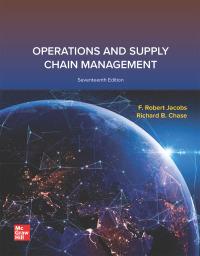In each of the following, name the term defined or answer the question. Answers are listed at
Question:
In each of the following, name the term defined or answer the question. Answers are listed at the bottom.
1. Anything that does not add value from the customer’s perspective.
2. An integrated set of activities designed to achieve production using minimal inventories of raw materials, work-in-process, and finished goods.
3. The Toyota Production System is founded on these two philosophies.
4. The set of value- and non-value-adding activities required to design, order, and provide a product from concept to launch, order to delivery, and raw materials to customers.
5. The Japanese philosophy focuses on continuous improvement.
6. A philosophy in which similar parts are brought together in families for production purposes.
7. Means producing only what is needed when needed and no more.
8. A period during which the production schedule cannot be changed.
9. Producing a mix of products that matches demand as closely as possible.
10. A production control system that uses a signaling device to regulate the flow of material.
11. If the lead time for an item is exactly five days, the demand is a constant four units per day, and the shipment container contains two units, how many kanban card sets would be needed? (Assume 0 percent safety stock.)
12. A firm wants to justify smaller lot sizes economically. Management knows that it cannot change the cost to carry one unit in inventory because this is largely based on the value of the item. To justify a smaller lot size, what must it do?
Step by Step Answer:

Operations And Supply Chain Management
ISBN: 9781265071271
17th Edition
Authors: F. Robert Jacobs, Richard Chase





